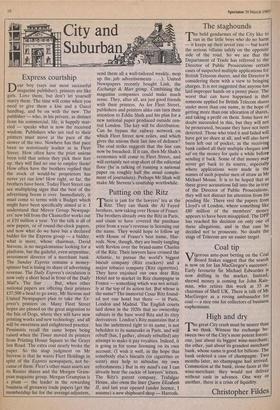Express courtship
Dear boy (says our most successful magazine publisher), printers are like girls. Love them, but don't let yourself marry them. The time will come when you need to give them a kiss and a Gucci handbag, and be on with the new. The publisher — who, in his private, as distinct from his commercial, life, is happily mar- ried — speaks what is now the received wisdom. Publishers who are tied to their printers must move at the pace of the slower of the two. Nowhere has that pace been so notoriously leaden as in Fleet Street. How often have the print unions been told that unless they pick their feet up, they will find no one to employ them! How often have the brothers replied that the stock of would-be proprietors has never yet run low! How right, so far, the brothers have been. Today Fleet Street can see multiplying signs that the best of the advertising boom is over. Immediately, it must come to terms with a Budget which might have been specifically aimed at it. I understand that Mirror Group Newspap- ers' new bill from the Chancellor works out at £10 million a year. Yet the talk is all of new papers, or of round-the-clock papers, and now what do we have but a declared bidder for the Express group — a bidder, what is more, whose chairman, David Stevens, is no megalomaniac looking for a platform, but the guileful, even serpentine, investment director of a merchant bank. The Sunday Express remains a money- spinner but is losing its share of advertising revenue. The Daily Express's circulation is now only a short head in front of the Daily Mail's. The Star . . But, when other national papers are offering their printers £37,500 a head to go away, Mr Stevens and United Newspapers plan to take the Ex- press's printers on. Many Fleet Street hopes are pinned on the great migration to the Isle of Dogs, where they will have new printing works and new technology, and all will be sweetness and enlightened practice. Pessimists recall the same hopes being raised when the Times moved its printers from Printing House Square to the Grays Inn Road. The extra cost nearly broke the paper. So the snap judgment on Mr Stevens is that he wants Fleet Holdings in spite of the Express newspapers, not be- cause of them. Fleet's other main assets are its Reuter shares and the Morgan Gram- pian magazine group. Morgan Grampian is a plum — the leader in the rewarding business of giveaway trade papers (get the membership list for the average-adjusters, send them all a well-tailored weekly, mop up the, job advertisements . . .). United Newspapers recently bought Link, the Exchange & Mart group. Combining the magazine companies could make much sense. They, after all, are just good friends with their printers. As for Fleet Street, publishers and printers alike can turn their attention to Eddie Shah and his plan for a new national paper produced outside cen- tral London. The key will be distribution. Can he bypass the railway network on which Fleet Street now relies, and which gives the unions their last line of defence? The coal strike suggests that the line can now be breached. If it can, then Mr Shah's economics will come to Fleet Street, and will certainly not stop short of the editorial floor (he is talking of running a national paper on roughly half the usual comple- ment of journalists). Perhaps Mr Shah will make Mr Stevens's courtship worthwhile.














































 Previous page
Previous page